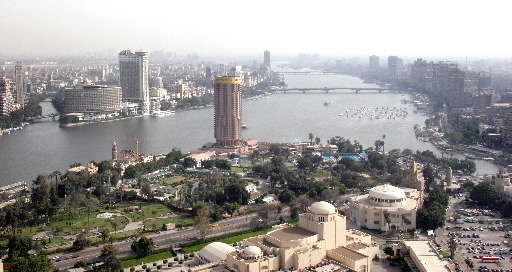Nuclear Weapons Can Be Eliminated: Chapter 10, Part 5
May 17, 2010
Chapter 10: The Middle East, Flash Point of the World
Part 5: Road map toward zero nuclear weapons
by Keisuke Yoshihara, Staff Writer
Egypt leads efforts to create a nuclear-free Middle East
I pondered a question: "If peace is achieved in the Middle East, would Israel then give up its nuclear weapons?" I first asked this question in Israel.
Emily Landau, a senior research associate at the Institute for National Security Studies, responded that this is the "only road" for denuclearization in the Middle East. Ms. Landau said, "Israel isn't hated because it has nuclear weapons. It has nuclear weapons because it is hated."
"At the same time," said Dov Khenin, a member of the Israel Parliament (Knesset), "we must pursue a path along which Israel would be willing to give up its nuclear arms first." With Iran's suspected nuclear weapons development and the issue of Palestine in mind, Mr. Khenin continued, "The danger in the Middle East has escalated in a brief period of time. We are now at a crossroads. We must consider how Israel and the Arab Nations, as well as Israel and Palestine, can achieve a peaceful coexistence in the region. That is the key to preventing a crisis in the Middle East."
Meanwhile, Egypt has insisted that a Middle East free of all forms of weapons of mass destruction should be sought. Its resolve resulted in the Resolution on the Middle East at the Nuclear Non-proliferation Treaty (NPT) Review Conference of 1995 which calls on all states in the region to work toward establishing a Middle East zone free of weapons of mass destruction.
However, no further developments have occurred since then. Thus, the Egyptian government is expected to raise the issue again at this year's NPT Review Conference. As Egypt chairs the Non-Aligned Movement (NAM), the nation has reportedly begun talks with U.S. officials on the matter.
Last summer, Egyptian President Hosni Mubarak visited the United States. When U.S. President Barack Obama proposed that the U.S. "nuclear umbrella" be extended over Egypt, President Mubarak declined the offer.
In 1974, before Egypt had pursued a zone free of weapons of mass destruction in the Middle East, the nation, along with Iran, proposed a resolution for the denuclearization of the region to the U.N. General Assembly. This highlights the fact that the "denuclearization of the Middle East" has long been an Egyptian aim and therefore Egypt has no interest in being defended by nuclear weapons.
Moreover, if a foreign military power is stationed on the land, "this would be equal to subjugation to that nation," said Emad Gad, a research fellow at the Al-Ahram Center for Political and Strategic Studies, as he assessed President Mubarak's true intentions behind his rebuff of the nuclear umbrella.
Mostafa Elwi Saif, a member of the Shoura Council, a body akin to the Egyptian parliament, stressed, "If Iran should follow Israel in the possession of nuclear weapons, this will provoke other nations. Therefore, we insist that Israel abandon its nuclear arms and join the NPT as a non-nuclear weapon state. It is essential, too, that efforts are made to prevent Iran from using nuclear power for military purposes."
Toward this end, Mr. Saif emphasized that a different form of commitment by the United States is essential, rather than the provision of the nuclear umbrella. "Israel owes its possession of nuclear weapons to the West and has been defended by the West," he said. "Therefore, the West, which is responsible for the cause, is also responsible for turning Israel back into a non-nuclear state."
(Originally published on May 1, 2010)








